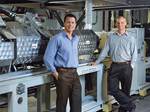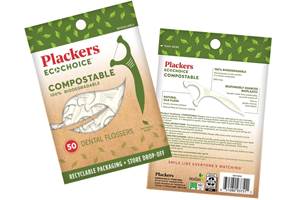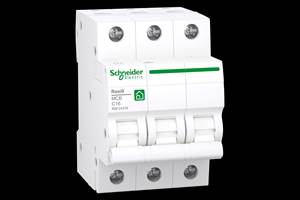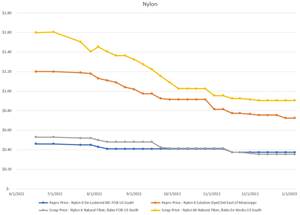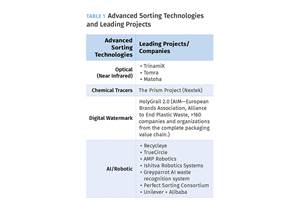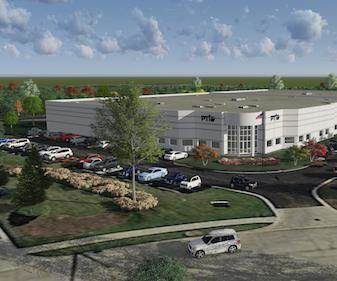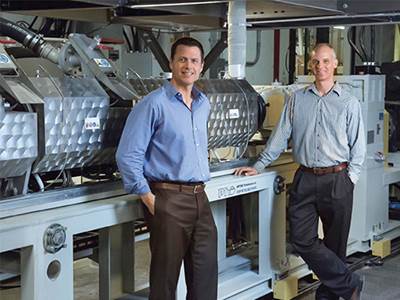Trials Show 'Dryer-Less' System Converts Mixed Regrind Into High-Quality Thermoformed Sheet
In production-scale trials, PETG and APET scrap bypasses landfill thanks to PTi's high-vacuum, twin-screw extrusion system.
Processing Technologies International (PTi), Aurora, Ill., recently demonstrated that its unique “dryer-less” twin-screw sheet extrusion production system can convert mixed regrind--so called "GAG" combinatons of PETG and APET--into high-quality thermoformed sheet for consumer packaging.
“Our dryer-less twin-screw system is a new option that is well suited to process post-consumer and post-industrial PET GAG regrind, unlike conventional extrusion systems that require a dryer and a crystallizer,” says Sushant Jain, senior scientist for PTi. Production-scale trials were run on PTi’s 85-mm high-vacuum twin-screw extruder with 100% GAG scrap. Clear mixed material sheet was produced thus demonstrating a successful method to recycle GAG sheet scrap. The final blend was composed of approximately 20% PETG/80% APET.
Many thermoformers use a PET-GAG sheet, which is a PETG/APET/PETG multilayer sheet structure for consumer packaging. The benefit of this structure is that the PETG layers offer superior heat sealing and printing properties over APET. However, the scrap from this sheet structure ends up in a landfill because extruders can’t effectively process this material with conventional equipment.
Recycling the trim and thermoforming skeleton scrap is a challenge due to the widely different drying temperatures for PETG and APET, according to PTi’s Jain. PETG’s drying temperature is 150 F (66 C) while APET’s is approximately 300 F (149°C). At higher temperatures, pellets/flake can agglomerate and plug up the crystallizer and dryer. PTi’s patented High-Vacuum Twin-Screw Extruder (HVTSE) technology, which allows PET to be processed without the need for crystallizing and drying, can easily convert this material into usable sheet.
HVTSE systems ranging from 85 to 170 mm are capable of processing PET at rates ranging from 2300 lb/hr (1,045 kg/hr) to 5500 lb/hr (2,500 kg/hr), and convert a variety of resins, including post-consumer and industrial PET/PLA, PP, HDPE, HIPS and more. The energy-efficient design allows virgin or recycled PET to be processed without the need for raw material drying and crystallizing. It employs a single atmospheric and dual high-vacuum, vent system with a co-rotating twin-screw extruder. This novel approach allows moisture and other volatiles to be removed as part of the extrusion process. The dryerless sheet extrusion system is an eco-conscious manufacturing solution which delivers major energy and cost savings, according to Matt Banach, PTi’s senior vice president of sales and marketing. It is a significant reduction in the carbon footprint of virgin and recycled PET sheet production.
In terms of sustainability advantages, the HVTSE process provides a reduction of about 80-85 kWh/1000 lb in energy consumption versus conventional PET processing. This savings equates to more than 31.6 gigawatt hours of annual power consumption when factored across PTi’s 470 million lb of theoretical installed HVTSE PET capacity base. The resultant energy savings could mean a reduction in CO2 gas emissions of more than 23 million pounds per year from fossil-fuel burning power plants, the company estimates.
The results of the successful demonstration project are being transferred to PTi customers. The company is also focused on the development of other new technology that converts mixed materials of dramatically different (incompatible) densities, melt temperatures and melt indexes, etc. into durable goods.
The system has been available in North America from PTi since 2010, when it signed an exclusive agreement with Luigi Bandera Meccaniche S.p.A. of Milan, Italy, which developed the technology.
Related Content
How to Optimize Injection Molding of PHA and PHA/PLA Blends
Here are processing guidelines aimed at both getting the PHA resin into the process without degrading it, and reducing residence time at melt temperatures.
Read MoreResins & Additives for Sustainability in Vehicles, Electronics, Packaging & Medical
Material suppliers have been stepping up with resins and additives for the ‘circular economy,’ ranging from mechanically or chemically recycled to biobased content.
Read MoreRecycled Material Prices Show Stability Heading into 2023
After summer's steep drop, most prices leveled off in the second half.
Read MoreRecycling: What's Ahead in Advanced Sorting Technology
As the industry tries to ramp up recycling, there are several innovative sorting solutions in the offing—ranging from enhanced optical sorting technologies and chemical tracers to advanced solutions based digital watermarks and artificial intelligence.
Read MoreRead Next
PTi to Expand Headquarters
The sheet extrusion machinery supplier will invest $10 million in an expansion that will nearly double manufacturing space and capacity at its Aurora, Ill. headquarters.
Read MoreThere’s No Lid on This Processor’s Creativity
For this lid maker, the keys to success are speed, flexibility and ingenuity.
Read MoreLead the Conversation, Change the Conversation
Coverage of single-use plastics can be both misleading and demoralizing. Here are 10 tips for changing the perception of the plastics industry at your company and in your community.
Read More

